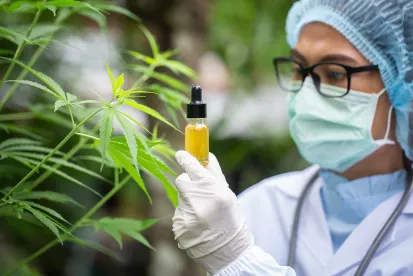Cannabis operators (from marijuana to hemp-derived products such as CBD) often get the sense they are one of the central targets of the federal government’s reach. But they are not in the same league lately as the COVID-19 virus. Earlier this month, those worlds collided.
The U.S. Food and Drug Administration (FDA) and the Federal Trade Commission (FTC) jointly issued warning letters to companies that have claimed or implied that these companies’ products will cure, mitigate, treat, or prevent coronavirus disease 2019 (COVID-19). As the agencies made clear, no drugs containing CBD have been approved for the treatment or prevention of COVID-19. We have previously covered similar warning letters regarding marketing of CBD products (here and here). These warning letters are not limited to CBD companies, either; the FTC has previously issued similar warning letters in 2020 to companies for making similar claims regarding the ability of other products to treat or prevent COVID-19.
The agencies warned these companies that such representations are violations of the Federal Food, Drug, and Cosmetic Act (FDCA) and Federal Trade Commission Act, and demanded that these companies take immediate action to cease such representations as to their products. In one instance, the agencies noted that the company’s website contained a link to a 2021 study by the National Institute of Health stating that CBD “reverses many effects of COVID-19, preventing the infection from worsening and promoting future immunity;” a study by researchers at the University of Chicago showing “a significant negative association with positive COVID tests” for individuals taking CBD; and a study by the 2022 American Chemical Society and American Society of Pharmacognosy finding that CBD binds to spike proteins of COVID-19 and prevents the virus from entering cells and causing infection. After citing these studies published on the company’s website, the agencies demanded that this company “take immediate action to address the violations cited in [the] letter.” The agency letters serve as a stark reminder that companies should avoid marketing a substance’s purported health benefits or efficacy in treating or preventing disease, regardless of the evidence that may exist to support such a statement, unless that product has been approved, cleared, or authorized by the FDA for such purpose.





 />i
/>i
